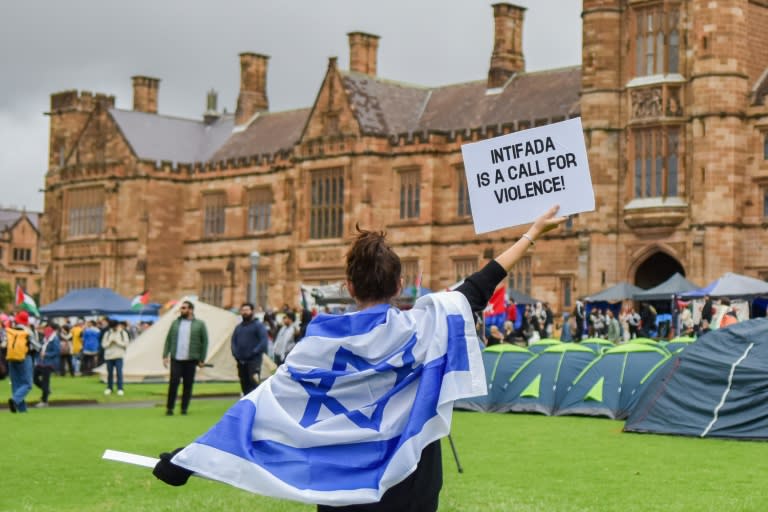Campus protests over Gaza war hit Australia

Hundreds of supporters of Israel and Gaza faced off at a Sydney university Friday, bringing echoes of US college protests and Middle East tumult to a campus and continent on the other side of the world.
Rival demonstrators came eye-to-eye shouting slogans and waving flags. Still, except for a few heated exchanges, the protest and counterprotest passed off peacefully.
But it was another sign that the war in Gaza, approaching its seventh month, and the long-rumbling US culture wars are roiling politics oceans away.
Pro-Palestinian demonstrators have been camped for 10 days on a green lawn in front of the University of Sydney's sprawling Gothic sandstone edifice -- a bastion of Australian academia.
The dozens of tents festooned with banners and Palestinian flags have become a focal point for hundreds of protesters -- students and otherwise -- who oppose Israel's ground invasion and bombardment of Gaza.
Deaglan Godwin, a 24-year-old arts and science student and one of the camp's organisers, said US protests were both an inspiration and a warning.
New York's Columbia University, the scene of police crackdowns and mass arrests, inspired "us to set up our own camp", Godwin said.
He said Columbia is "also now a warning, a warning that the government is willing to use quite lethal, brutal force in order to put down Palestinian protesters".
Similar to their US counterparts, the protesters want to see Sydney University cut ties with Israeli institutions and reject funding from arms companies.
Sydney University administrators are keen not to replicate the US experience.
Vice-chancellor Mark Scott has written to students and staff expressing a "commitment to freedom of expression" and has not called on the police to dismantle the camp.
Australian police were conspicuously absent even during Friday's protests, which brought about 100 pro-Israel counterprotesters face-to-face with 400 demonstrators at the pro-Palestinian camp.
Public order and riot squad vehicles were parked well out of view, on the periphery of the campus.
Security was left to university guards who exchanged jokes with each other about their ill-fitting high visibility coats while forming a very porous separating barrier between the opposing camps.
A few inquisitive Chinese students stopped to take a look on the edges of the demonstration, while the media surveyed the scene and a right-wing vlogger hunted for any hint of confrontation or violence.
- 'Stop hate, mate' -
But like the United States, allegations of extremism have been levelled at Sydney's pro-Palestinian protesters.
Jewish groups have voiced concern that slogans about the "Zionist entity" and "from the river to the sea" are evidence of rising antisemitism.
Against that backdrop, more than a hundred Jewish and pro-Israeli protesters decided to march near the pro-Palestinian encampment Friday, hoping to send a message that Jewish students are safe on campus and that they, too, have the right to be heard.
Wearing T-shirts reading "stop hate mate" they sang "Hatikvah" -- Israel's national anthem -- acapella and danced to the cheesy Australian pop classic "A Land Down Under".
Protester David Treves said he hoped the march would show people there is more than one perspective about what is happening in the Middle East.
"I'm not looking to change people's opinion. I'm looking just to get them to think," he said, voicing concern that the camp could incite the type of clashes seen in the United States.
"As long as it's legal, as long as within the law I have nothing against it. There is free speech in Australia" he said. "I wouldn't go and aggressively just remove the whole thing. But I don't want it to get out of hand."
A small group of counterprotesters donned tefillin -- the black leather boxes and straps usually worn during Jewish prayer that have come to signify more orthodox and conservative views.
Another group of students wearing keffiyeh scarves linked arms in a circle and danced the dabkeh -- a Levantine dance popular at weddings.
When the groups came together a few from each camp confronted each other and traded slogans, but the tension was quickly defused.
arb/pbt

